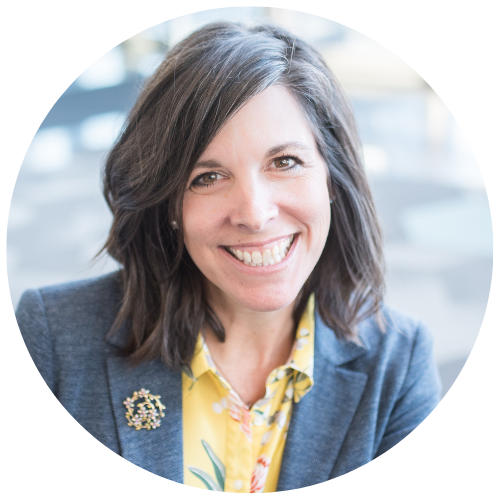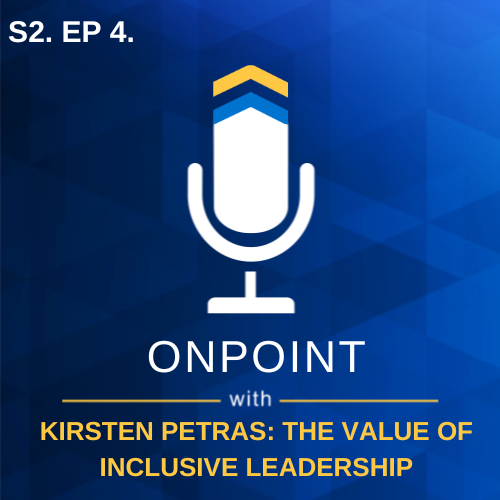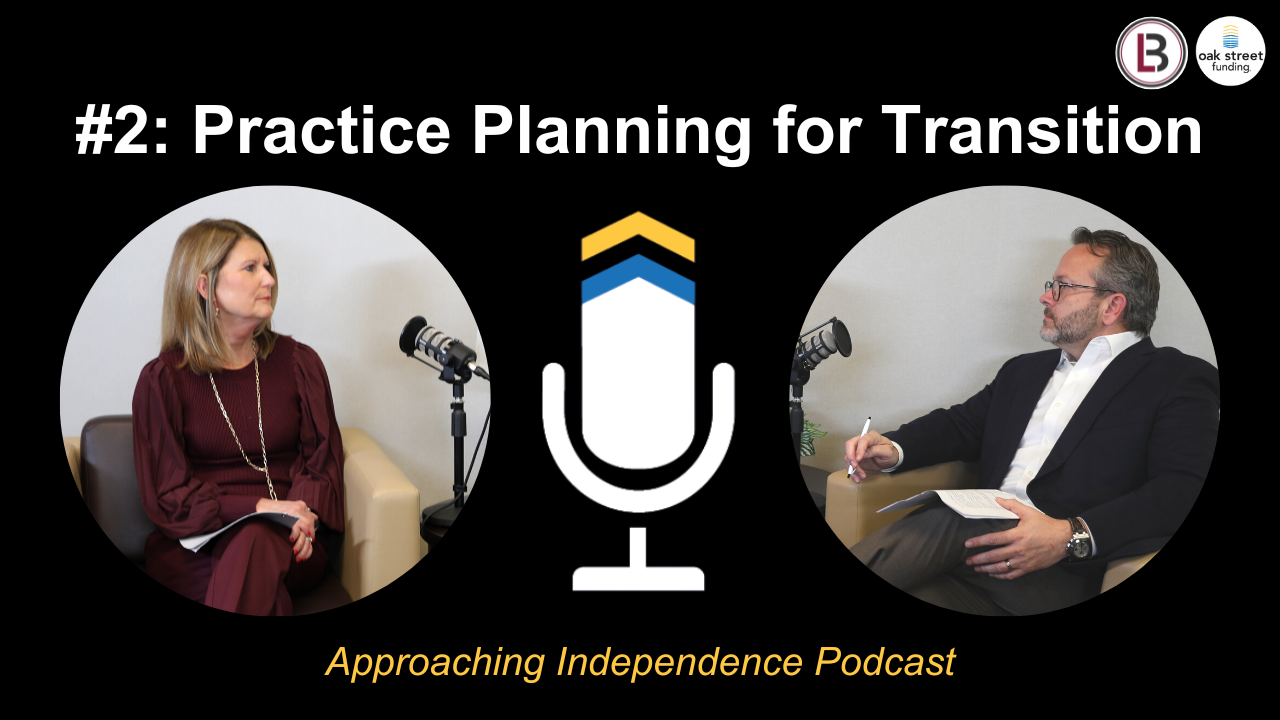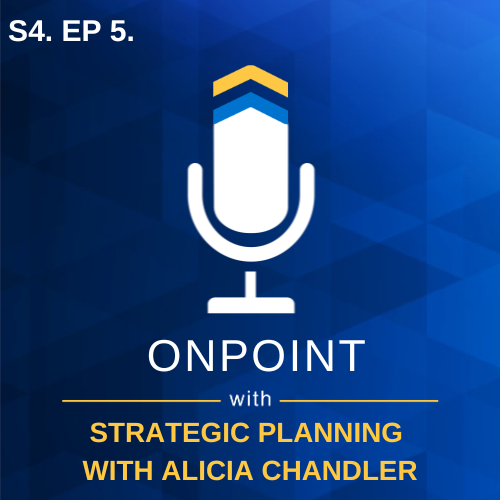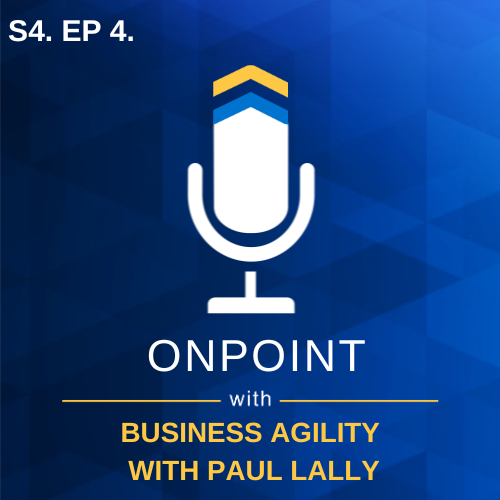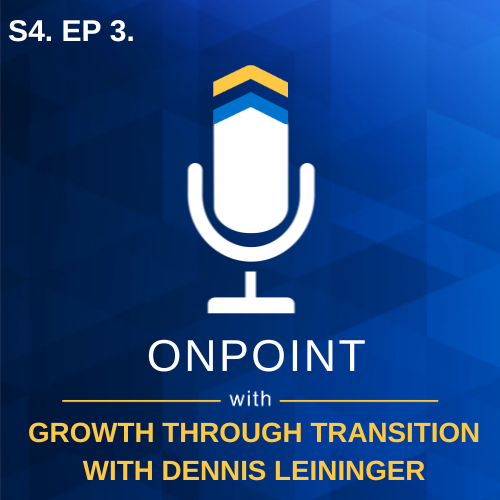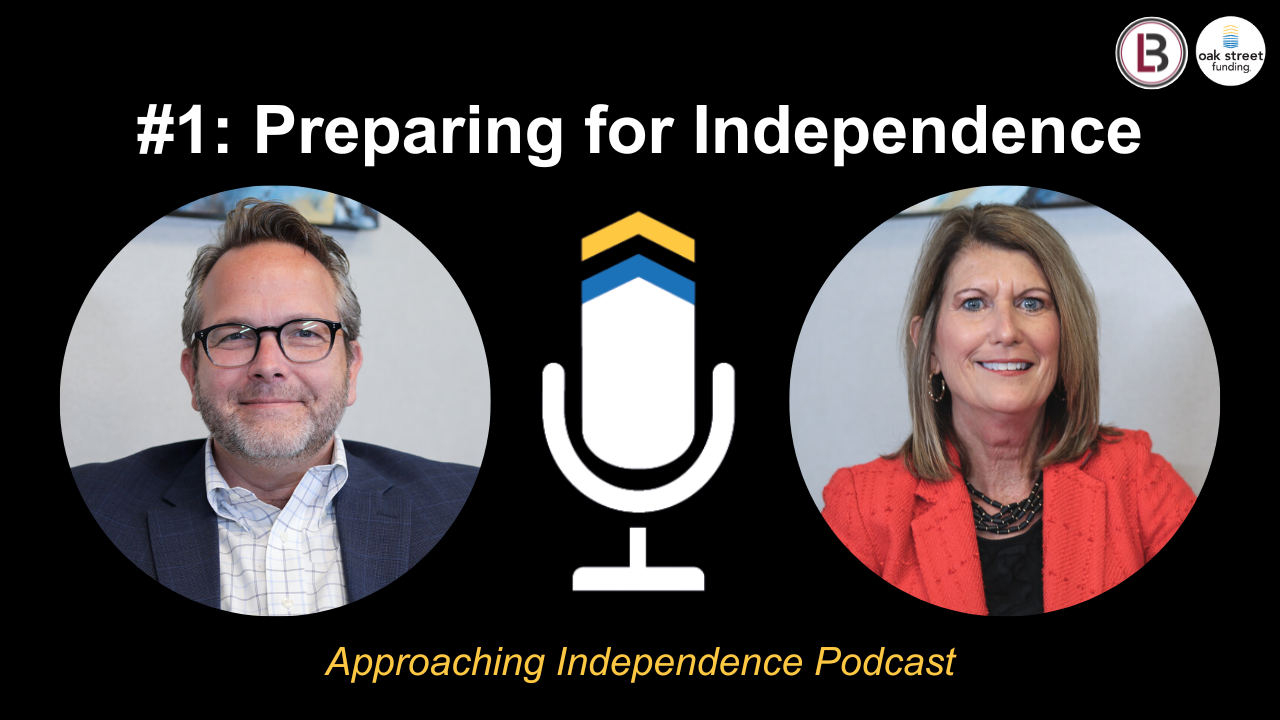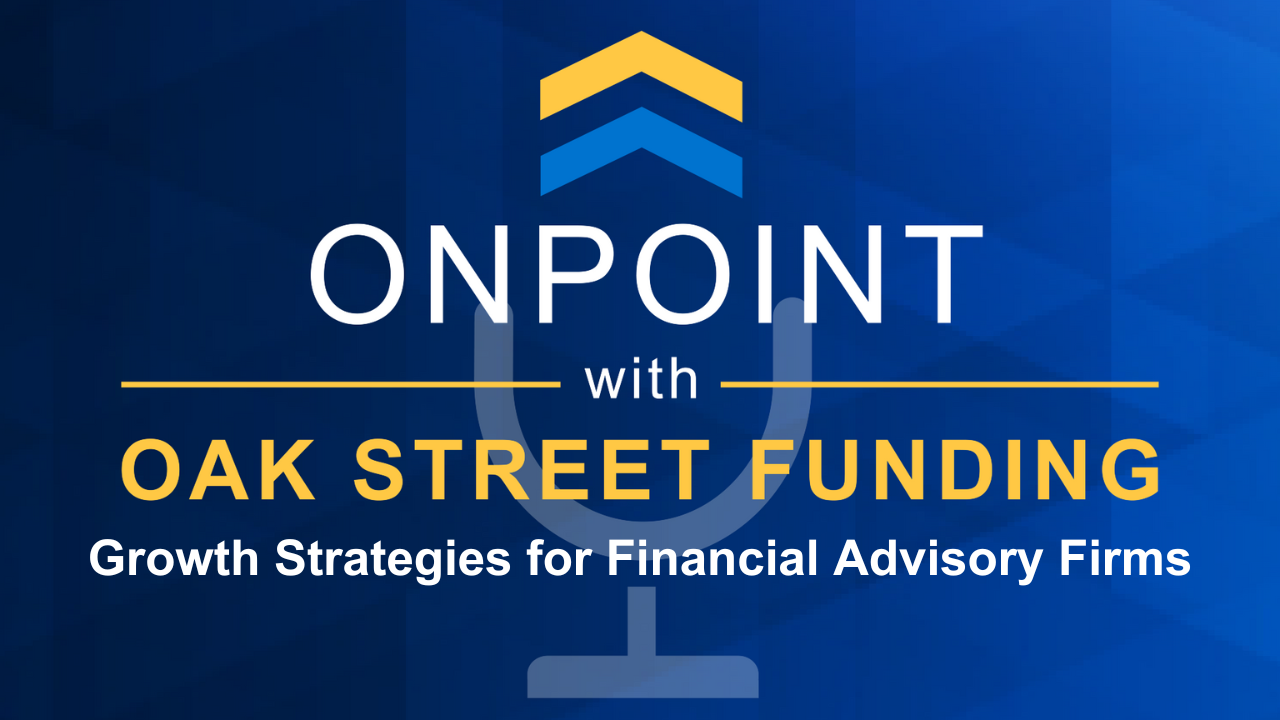S2. EP. 4 - The Value of Inclusive Leadership with Kirsten Petras of Oak Street Funding
- 0.5
- 1
- 1.25
- 1.5
- 1.75
- 2
Bridget Haight: Hi, and welcome to OnPoint, a podcast by Oak Street Funding, where we bring research and data backed insights to dig into the minds of industry leaders, to learn how to stand out, to navigate and to break through this ever changing industry. I'm your host Bridget Haight, and you can support this podcast by following us on Spotify, Apple Podcasts, on our website, or wherever you get your podcasts. We will be there hanging out, talking to industry leaders and ready to empower you to grow your business. Now, let's get on point. Today, we welcome Kirsten Petras, director of marketing and partnerships at Oak Street Funding. Kirsten is also co-chair of 50/ 50 Women on Boards, an organization dedicated to increasing diversity in corporate America. Today, Kirsten is going to share the value of inclusive leadership to help all business leaders embrace and encourage diversity in their organizations. Welcome to the show, Kirsten.
Kirsten Petras: Hey, Bridget. Good morning. Thank you. Thank you for having me.
Bridget Haight: Oh, this is going to be fun.
Kirsten Petras: Yeah.
Bridget Haight: So, we're here to talk today about leadership. So to start, could you describe your leadership style?
Kirsten Petras: So, this is a great question, right? Because we live in our daily roles on a moment by moment basis, and it's like, how do you describe it? So, if you look at the defined leadership styles there are out there, I think my style probably falls in what's known as the visionary style. This is a style where you lead your team to the greater goal, the greater strategy, and then you are able to clearly communicate to them how what they're contributing contributes to the greater goal of the organization.
Bridget Haight: Okay.
Kirsten Petras: Within all of that, you need to really be able to motivate your team by getting to know them, understand what's important to them, get to understand where their strengths are, help them optimize their strengths to achieve their goals. But in the end, this visionary title is really about moving everyone forward towards the greater goal. So, I guess if I had to truly define it in a way you find out there in the worldwide web, that's possibly the way I would do it.
Bridget Haight: Visionary.
Kirsten Petras: Visionary.
Bridget Haight: I like it. So, what is an inclusive leader, and how are they different from a traditional leader?
Kirsten Petras: Great question. So, first of all, I want to realize that just merely having this conversation today is a first step around building an inclusive mindset. There's a lot of talk about diversity, equity, and inclusion as if these three things are just the same thing almost. Recognizing that they're three different level levers that are used in that can be used in a different way at any given time as you're trying to take a little bit more modern approach to inclusivity. And these conversations is a great thing. Now, in terms of me being a leader who tries to lead with inclusion in mind, I mean, it's a journey and I'm stumbling along the way like everybody else. So, I think one important aspect is to recognize that people are trying more than ever before, and that we need to give some grace as we make it along this journey. But progress is happening at a rapid pace. So, what does it mean in regards to a traditional leader? I think traditional leadership does not have to be seen as non-inclusive. It's just not something where inclusivity was front and center as it is today. I've worked for an incredibly inclusive leader before. It just wasn't branded that way, right? So, now what we have is an opportunity to go from something where it's not front and center and part of the fabric and the design of the overall leadership of an organization, and be mindful of making it part of how leadership is. It's not just one leader, it is the culture of our leadership to drive inclusivity of thought, and that comes from building a room filled with diverse people. And diversity can mean a number of things. I think our first thought of diversity is around people that look different or come from different backgrounds, but you can have diversity of age, diversity of experience. So, the differences between traditional leaders, if that's what we want to call them, and an inclusive leader is more around intentionality of inclusivity being part of how you're going to lead your group.
Bridget Haight: Great. Okay. So, what is the biggest challenge of inclusive leadership?
Kirsten Petras: Well, I think not knowing what it means.
Bridget Haight: Yeah.
Kirsten Petras: I mean...
Bridget Haight: That's probably...
Kirsten Petras: So, here at our organization, and our parent company First Financial Bank, we made it front and center conversation of what it means. And there's been a number of conversations, programs, focus groups, because you got to have a common definition so everybody's, as a mentor of mine would say, singing from the same hymnal, right? And so, you got to know what it means. So you, again, as I mentioned; diversity, equity inclusion are tossed together quite a bit, and that's fine. It's good. At least they're being spoken about. But if you think of diversity as making room at the table, meaning you're already there and you're going to squeeze in tighter to get somebody else to fit; inclusion is probably better said that while you're setting the table, it is with bringing more people together in mind. Or if you're setting the table for four people, maybe it's not the same four people you had had there. So, inclusion is understanding what it means to you, and that's just going to take a little research, talking to some people. There's a number of organizations out there that are helping leadership groups and organizations come to these conclusions so they know how to take action.
Bridget Haight: Okay. Getting curious.
Kirsten Petras: Getting curious, exactly. It does begin with curiosity, and an interest in doing better through that curiosity.
Bridget Haight: Great. That was a term that was brought to by Sarah in another podcast.
Kirsten Petras: Yeah.
Bridget Haight: What are the benefits of inclusive leadership? I mean, in other words, where is the value of inclusive leadership?
Kirsten Petras: Well, sure. Again, easy information to find out there, mainly because it's so front and center in the conversation today. But there's an organization based out of Boston, Massachusetts named Linkage, and I have some of their stats here.
Bridget Haight: Oh.
Kirsten Petras: "Organizations with inclusive cultures are two times as likely to meet or exceed financial targets."
Bridget Haight: Wow.
Kirsten Petras: "Three times as likely to be high performing." And you have a lot of conversation coming out of COVID of having a high performing team, high performing mindset, engaged employees; and this is a direct correlation between an inclusive culture within the organization and getting that high performance. They're one and a half times to be more creative and collaborative and innovative. As I think in watching your podcast with Sarah, she mentions about bringing more ideas together and how you get greater numbers of ideas. And then actually, they can be faster in making decisions. So, there's...
Bridget Haight: All good things.
Kirsten Petras: All great things. And the stats of the benefits of diversity and the benefits of inclusion have been around for a while. The business case has been around for a while. It's the taking action that has been delayed or not optimized. So, I think where you see real progress in the last couple years is taking action. A lot of companies have known this is important and they need to do it, but the reality of the change has been slow to come. Now in the recent past, the last couple of years, the organization that I like to support and that I'm a part of, of 50/ 50 Women on Boards; their primary focus is about getting more women and diversity in the corporate boardroom. And there have been state mandated requirements for this. Of course that helps get the traction behind it. But really, it's making the awareness happen, making the business case, creating the qualified talent pool. So, an organization like 50/ 50 Women on Boards is doing all of those things to be able to not only say, "You have to have more women in the boardroom," but rather, "Let's get some qualified women in the boardroom," and there's qualified women and people of color and women of color. They're all over, but connecting the two is important. Because historically, you hear people say you get your employment through networking. You certainly get on corporate boards through heavy networking.
Bridget Haight: Yep.
Kirsten Petras: Well, if the groups that are networking are only networking with people that are just like them.
Bridget Haight: With themselves, yeah.
Kirsten Petras: It stays very, very homogenous.
Bridget Haight: Sure. Inbred.
Kirsten Petras: Exactly. Exactly. So, in terms of progress, this stat just came out this week. It's one of the key findings of..." Women now hold 27.3% of the Russell 3000 corporate board seats." That's a 0.6 percentage point increase just from Q4 of 2021.
Bridget Haight: Oh, wow.
Kirsten Petras: So, the business case has been there, and the action is now taking shape.
Bridget Haight: Yeah. You said it was rapid.
Kirsten Petras: It's rapid.
Bridget Haight: It's great.
Kirsten Petras: It's happening quickly.
Bridget Haight: So, why is inclusive leadership so important?
Kirsten Petras: Well, I think we're pretty boring when you're just with people just like you, right? If you're just surrounded by people who only bring the same experiences, only can say, "Yes, that's a good idea," because they only can reflect on the same historical experiences, it's pretty flat and boring. And to the stats of, the organizations that are able to exceed financial targets, get more creative, innovative, and collaborative and make decisions faster; with the businesses we work with, their primary focus is to grow. And the other gap that they have is the need to find high performing, next generation talent, and so...
Bridget Haight: And retaining them.
Kirsten Petras: And retaining them.
Bridget Haight: That's a theme that we've had in this podcast a lot is getting this diverse and inclusive group of people and then retaining them.
Kirsten Petras: And then retaining them. So, I'm fortunate enough to lead a team of people that are relatively new in their careers. And as their leader, it's beneficial to me to open up my mind...
Bridget Haight: Absolutely.
Kirsten Petras: To what they're bringing to the conversation. It's almost a reverse mentoring. So, having your own level of self awareness. Giving yourself permission that maybe you didn't do it before, but you're trying to do it now.
Bridget Haight: Right.
Kirsten Petras: You don't have to hold onto your defensive choices of the past. Let that go. That's on you, that's not on them. Don't put that on them, that's on you. Put that behind you, start actively listening to what's being said. I have a real language barrier with my team sometimes. They love to remind me that what I'm saying is really outdated at this point, and I don't even think I'm old, right?
Bridget Haight: Nope.
Kirsten Petras: But I think they think I'm old. But I'm wanting to be better. I'm not worried about defending how I used to do it. And I think if you can let that go on a personal level and be open. So, in your question of the overall benefits of it and why it's important, it'll bring new ideas. We wouldn't have this podcast if it wasn't for another idea, right? Podcasts wouldn't exist if it wasn't for somebody else having an idea. So, you just are stuck if you're not thinking forward. And if you can't think of something forward, bring some people in the room that bring those ideas.
Bridget Haight: Great. So, you think that the younger generation is already inherently more aware of...
Kirsten Petras: Oh, I do. Yeah.
Bridget Haight: I do, too.
Kirsten Petras: I have young children at home, but they're old enough to talk, right? But just even watching them and how they interact with their friends and their classmates. They correct me on certain things. They're already using a language that's different than the language that I use.
Bridget Haight: Wow.
Kirsten Petras: It's certainly different than the language their grandparents use.
Bridget Haight: Yes.
Kirsten Petras: And what I love seeing is, they say grandparents get to love in a different way than parents do, right?
Bridget Haight: Yes.
Kirsten Petras: They just get to love so unconditionally to watch my children and my parents speak to each other, and them educating my parents to certain things, and their willingness to just take it all in from their grandchildren.
Bridget Haight: Oh, that's great.
Kirsten Petras: I think it's a wonderful thing. So, yeah. The next generation is already making this just part of who they are.
Bridget Haight: It will increasingly get better as the years go by.
Kirsten Petras: Exactly. Exactly.
Bridget Haight: I think that's a very hopeful way to look at things.
Kirsten Petras: Exactly. Exactly. And there's a generation of working people who are already doing this too.
Bridget Haight: Oh, yes. Yeah. For sure. So, leaders who are working to be more inclusive may face opposition from others in the organization. So, we talked a little bit about this. What advice would you have for a leader faced with the negative biases of others?
Kirsten Petras: I guess going back to that visionary leadership style. This is something that everyone may not see value in. If you are a leader, and this applies to not just this but any topic I suspect. If you are passionate about it and you can make the case study for it and you can get that communicated to your team, and they're still not bought in, it may be appropriate to have some conversations as to why not.
Bridget Haight: Right.
Kirsten Petras: But there's also room for decisions to be made because it is what is good. People are fearful of what they don't know, and you don't come out of school necessarily knowing all these things. You don't come out of 20 and 30 years of work experience with this type of thought process in your day- to- day. And so, it's getting people comfortable adopting the idea that it doesn't take a lot. And I think the mountain in front of people right now when it comes to this, because it is so front and center in the conversation, is they're fearful because they don't know what it means. I hear a lot of things... Not necessarily with our group, I think our group is great actually in terms of hearing disparate voices up and down the organization and across genders and across all spectrums of people that can bring ideas. But you hear people say, "Well, I don't know how I would do this because we don't have a problem," or...
Bridget Haight: Ah, yes.
Kirsten Petras: Or, "This isn't for us. Our company's not big enough to worry about it." There's a number of reasons why people immediately put up barriers to it.
Bridget Haight: Sure.
Kirsten Petras: But in the end, it can just be a misunderstanding of how easy it is to move forward with it.
Bridget Haight: Right.
Kirsten Petras: So, the leader has to clearly be able to communicate the vision. You can communicate the vision of the financial results you're trying to drive, communicate the vision of the kind of culture you're trying to build, and you weave inclusivity into your culture. This comes down to how do you motivate and align your team with the vision.
Bridget Haight: Okay. So, what would you say to the leader who is interested in becoming an inclusive leader, but doesn't know exactly where to start?
Kirsten Petras: Oh, sure. Well, I think, again, people don't move forward because they just think it's this huge boulder you've got to push up a hill. I mean, Harvard Business Review, McKinsey, 50/ 50 Women on Boards, Linkage. I mean, there's a number... The Farote Group. There's a number of organizations that are putting information out there of small steps you can take, and I think you can take a small step.
Bridget Haight: Yep.
Kirsten Petras: Get curious.
Bridget Haight: Don't get too... Don't be overwhelmed by the intake.
Kirsten Petras: Don't be overwhelmed by it, right. Take a small step. Put a plan together. Most people are building their businesses because they have business plans. Put a little plan together.
Bridget Haight: Yeah.
Kirsten Petras: And then, don't be shy to get help where you need help. There are, in naming all those organizations, several organizations that are providing information, data, training.
Bridget Haight: Training, yeah.
Kirsten Petras: Resources. And so, if you want to fully adopt something, go and figure out how you can get it fully adopted and admit when maybe you can't do it alone.
Bridget Haight: Right.
Kirsten Petras: We have, here at the bank, done a great job over the last few years with some of our business resource groups, and they started relatively high level in terms of inclusivity, and now they're even getting more granular as our organization is learning more about what makes up our company in terms of backgrounds and differences. But baby steps. Don't think you got to change it overnight.
Bridget Haight: So, do you have one final inclusive leadership lesson for our listeners?
Kirsten Petras: Don't be afraid to make mistakes. I mean, we will. My team laughs at me on a regular basis, but I try not to take it personally, but I try to take it seriously.
Bridget Haight: The fact that they feel comfortable enough to laugh at you in front of your face means a lot.
Kirsten Petras: They do. They're laughing with me, but also at me. But don't be afraid to make mistakes. And I think taking one step forward is important. In the financial services world that we work in, there's actually more movement towards this than I think gets spoken about. CPA firms years ago recognized the importance of keeping high performing talented women within their organizations with the choices they also end up making about starting families. And women often are the ones that are taking care of now not just children, but also parents, and this balance of being able to do both and the value of keeping them in their companies at partner levels and high levels, while also giving them space to be able to do these things goes to employee retention. The financial services wealth management space has a very, very active conversation going right now that I see on a regular basis. There are a couple of groups that are driving real change about the adoptability of inclusivity and diversity as it comes to conferences and speakers. Representation matters, and there's some very powerful groups that are trying to lead a more goal of getting representation on the stage and getting representation out there, and that helps get the next generation of leaders to see that they can be a part of that world. And the insurance space has been for years driving the empowerment and uplifting getting away from what is stereotypically thought of as the insurance leader to a more diverse leadership and voices of power there as well. And so, what that brings is an interest of the next generation to want to enter those spaces. And so, you want both. As one of the original or founders, you may not look like what your next generation will look like, but you can build a legacy and a continuation of your business by having diversity come in with the next generations of your employees; and then comes more diverse clientele, more diverse revenue streams start coming in. And so, it gets back to that business case. But the hesitation to take the step I think comes more from the fear of making a mistake.
Bridget Haight: Yeah.
Kirsten Petras: And so, surrounding yourselves with people that can help you take small steps so as the mistakes are made, because they will be, they're not catastrophic mistakes that want to derail the entire initiative.
Bridget Haight: This has been great. Thank you so much for giving us these great lessons for leaders today about inclusivity. Before we go, what is your favorite holiday movie, and what does that say about you?
Kirsten Petras: Oh, my favorite holiday movie. I think I have two answers for that?
Bridget Haight: Okay.
Kirsten Petras: I have a holiday movie that might be known as a holiday movie and that's Love Actually.
Bridget Haight: Oh, yes.
Kirsten Petras: I love that movie. And then there's a movie we happen to watch as a family around the holidays and it's called Moonstruck.
Bridget Haight: I love Moonstruck.
Kirsten Petras: Which is a wonderful movie about family and just...
Bridget Haight: Generations.
Kirsten Petras: Generations and traditions, love and all those things. So I love Love Actually around Christmas, and you can find it all the time. It's just joyful. But Moonstruck is also, while not a holiday movie, something my family tends to watch around the holidays.
Bridget Haight: I love that. Well, thank you so much, Kirsten. It's been lovely having you here and thank you for joining us OnPoint.
Kirsten Petras: Thank you, Bridget.
Bridget Haight: Thank you all for listening to OnPoint, a podcast by Oak Street Funding, where we bring research and data backed insights to dig into the minds of industry leaders, to learn how to stand out, navigate, and break through this ever- changing industry. I'm Bridget Haight, and tune in next time wherever you listen to podcasts. See you then as we get on point. Don't forget to subscribe and leave us a review. Thanks for listening. To get in contact with someone at Oak Street Funding, please call 844-353-8022. That's 844- 353- 8022 to learn more.
DESCRIPTION
Today, we welcome Kirsten Petras, Director of Marketing and Partnerships at Oak Street Funding. Kirsten is also Co-chair of 50/50 Women on Boards – an organization dedicating to increasing diversity in corporate America. Today, Kirsten is going to share the value of inclusive leadership to help all business leaders embrace and encourage diversity in their organizations.
Today's Host
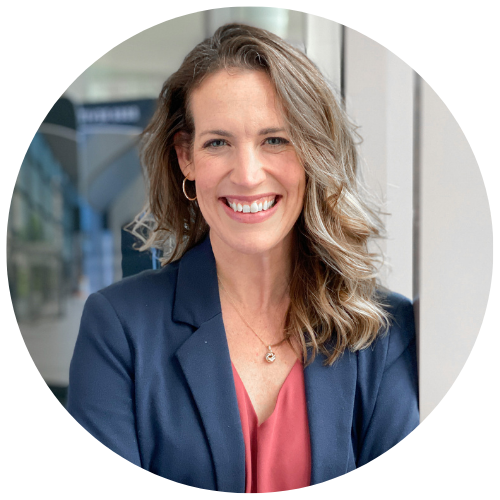
Bridget Haight
Today's Guests
